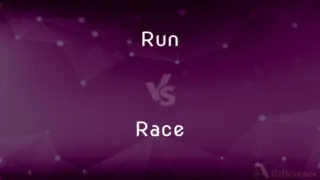Beans vs. Lentils — What's the Difference?
By Maham Liaqat & Fiza Rafique — Updated on May 15, 2024
Beans are larger legumes with a variety of shapes and colors, while lentils are smaller, lens-shaped legumes known for their quick cooking time and nutritional benefits.

Difference Between Beans and Lentils
Table of Contents
ADVERTISEMENT
Key Differences
Beans are a diverse group of large-seeded legumes, including varieties like kidney beans, black beans, and pinto beans. They are typically larger than lentils and come in a range of shapes and colors. Lentils, on the other hand, are small, lens-shaped legumes that cook quickly and are available in colors like green, brown, red, and black.
Beans require longer soaking and cooking times due to their size and density, whereas lentils cook much faster, often without the need for soaking. This makes lentils a convenient option for quick meals. For example, dried beans may need to be soaked overnight and then boiled for an hour or more, while lentils usually cook in about 20-30 minutes.
Nutritionally, beans are high in protein, fiber, and various vitamins and minerals. Lentils are also highly nutritious, rich in protein, fiber, iron, and folate, often considered more nutrient-dense due to their quicker cooking and absorption rates. Both are excellent sources of plant-based protein but lentils are often preferred for their ease of digestion and faster preparation.
In culinary uses, beans are versatile and used in dishes like soups, stews, salads, and casseroles. Lentils are commonly used in soups, stews, salads, and as a meat substitute in various dishes. Their texture and flavor adapt well to a variety of cuisines, from Indian dal to Mediterranean salads.
Comparison Chart
Size and Shape
Larger, various shapes and colors
Small, lens-shaped, various colors
ADVERTISEMENT
Cooking Time
Longer, often requires soaking
Shorter, usually no soaking needed
Nutritional Content
High in protein and fiber
High in protein, fiber, iron, folate
Culinary Uses
Soups, stews, salads, casseroles
Soups, stews, salads, meat substitute
Ease of Preparation
More preparation needed
Quick and easy to cook
Compare with Definitions
Beans
Large legumes.
Kidney beans are a popular choice for chili.
Lentils
Various colors.
Green lentils hold their shape well in salads.
Beans
High in protein and fiber.
Beans are a great source of plant-based protein.
Lentils
Small, lens-shaped legumes.
Red lentils cook quickly and turn mushy, perfect for soups.
Beans
Versatile in cooking.
Pinto beans are used in many Mexican dishes.
Lentils
Adaptable in recipes.
Lentils can be used as a meat substitute in vegetarian dishes.
Beans
Any of various twining herbs of the genus Phaseolus in the pea family, native to the Americas, having leaves with three leaflets and variously colored flowers, and widely cultivated for their edible pods and seeds.
Lentils
Nutrient-dense.
Lentils are rich in protein, fiber, and iron.
Beans
A seed or pod of any of these plants.
Lentils
Quick cooking time.
Lentils usually cook in about 20-30 minutes without soaking.
Beans
Any of several related plants or their seeds or pods, such as the adzuki bean, broad bean, or soybean.
Lentils
A leguminous plant (Lens culinaris) native to southwest Asia, having flat pods containing lens-shaped, edible seeds.
Beans
Any of various other plants or their seeds or fruits, especially those suggestive of beans such as the coffee bean or vanilla bean.
Lentils
The round, flattened seed of this plant.
Beans
(Slang) A person's head.
Lentils
Plural of lentil
Beans
Beans(Slang) A small amount
I don't know beans about investing.
Beans
Chiefly British A fellow; a chap.
Beans
To hit (another) on the head with a thrown object, especially a pitched baseball.
Beans
Plural of bean
Beans
S; drugs in pill form.
Popping beans
Beans
An insignificant value or amount.
Beans
A cut that reaches the hypodermis.
He told me he reached beans, I hope he’ll be okay.
Beans
Diverse shapes and colors.
Black beans are often used in Latin American cuisine.
Beans
Requires soaking.
Dried beans need to be soaked overnight before cooking.
Common Curiosities
Which cooks faster, beans or lentils?
Lentils cook faster, usually in about 20-30 minutes.
Do lentils require soaking?
No, lentils usually do not need soaking and cook quickly.
What are lentils?
Lentils are small, lens-shaped legumes known for their quick cooking time.
What are beans?
Beans are large-seeded legumes available in various shapes and colors.
Are lentils high in nutrients?
Yes, lentils are rich in protein, fiber, iron, and folate.
Can lentils be used as a meat substitute?
Yes, lentils are often used as a meat substitute in vegetarian dishes.
Do beans require soaking?
Yes, dried beans typically require soaking before cooking.
Are beans high in protein?
Yes, beans are high in protein and fiber.
Can you use beans in soups?
Yes, beans are a staple in many soup recipes.
Can beans be used in salads?
Yes, beans are commonly used in salads.
Can you use lentils in stews?
Yes, lentils are commonly used in stews.
Which legume is quicker to prepare?
Lentils are quicker to prepare compared to beans.
Are both beans and lentils good sources of plant-based protein?
Yes, both beans and lentils are excellent sources of plant-based protein.
Do beans have more variety in shape and color?
Yes, beans come in a wider variety of shapes and colors compared to lentils.
Which is easier to digest, beans or lentils?
Lentils are often considered easier to digest than beans.
Share Your Discovery

Previous Comparison
Angle vs. Corner
Next Comparison
Run vs. RaceAuthor Spotlight
Written by
Maham LiaqatCo-written by
Fiza RafiqueFiza Rafique is a skilled content writer at AskDifference.com, where she meticulously refines and enhances written pieces. Drawing from her vast editorial expertise, Fiza ensures clarity, accuracy, and precision in every article. Passionate about language, she continually seeks to elevate the quality of content for readers worldwide.












































